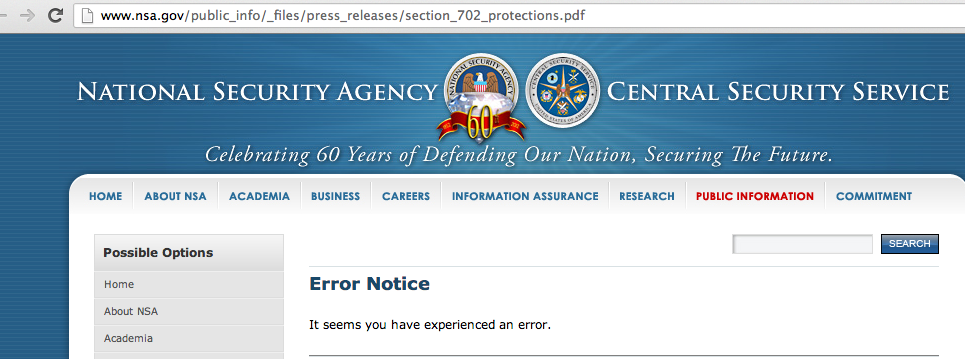Europe again stuck saying, “They told us they were sure”
The NATO members who refused overflight privileges for Bolivian President Evo Morales are, in the process of trying to justify what they did, revealing more details of what led them to risk such a diplomatic affront. Among other explanations, the Spanish foreign minister explained that “they” told the Spanish “they were sure” Snowden was on board Morales’ plane.
“They told us they were sure… that he was on board,” Mr Garcia-Margallo told Spanish television, without indicating who “they” are.
“And so the reaction of all the European countries that took measures – whether right or wrong – was because of the information that had been passed on. I couldn’t check if it was true or not at that moment because it was necessary to act straight away.”
In point of fact, it’s not yet clear Snowden wasn’t on the plane. While Austrian authorities checked the passports of the known passengers on the plane, they apparently did not conduct a thorough search. And 3 Spaniards who showed up to conduct a search were denied entry (though Morales did stop in the Canary Islands, which would have provided another opportunity to conduct a search on Spanish territory, but by that point Morales was already making a literal international incident about his treatment).
Then yesterday the heads of state from 5 other South American countries gathered in Cochabamba, Bolivia (why not La Paz?) to bitch about the actions of those NATO countries that had insulted Morales. If Snowden was on Morales’ plane, he may well be in any of 6 other countries by now (Brazil’s Dilma Rousseff sent an advisor — and note several attendees would have had to fly over Brazilian airspace to return home).
Or Snowden could be in Austria, which was one of the countries that had said Snowden would need to be in their country before it could consider an asylum request (there were pictures of Morales and Fischer from Morales’ layover that made them look quite jolly).
Or Snowden could still be in Sheremetyevo, though no one has ever seen him there. Russia’s Deputy Foreign Minister Sergei Ryabkov signaled impatience with Snowden today, even though in the past Putin said he would not extradite the leaker. But who knows whether the Russians, who are enjoying this game, are telling the truth?
So Snowden could foreseeably be in Argentina, Austria, Bolivia, Brazil, Ecuador, Russia, Suriname, Uruguay, or Venezuela. And there’s no reason to believe we’d know one way or another.
Meanwhile Ecuador chose yesterday, in the wake of the Morales slight, to complain about a bug placed in its Embassy in London. A bug they claim to have found last month.
Foreign Minister Ricardo Patino told a news conference in Quito the bug was found last month when Ecuadorean technicians reviewed the embassy’s wiring.
Now, Ecuador reportedly found the bug in connection with Patino’s trip to London June 16. Which ought to raise questions about why they’ve chosen this moment to make a stink about it. Did they leave it in place to sow disinformation? In any case, the bug has given Ecuador reason to raise tensions with England, which has avoided the badgering the other NATO European countries have.
So who knows where Snowden is? But in the meantime, US intelligence (presumably the “they” who were “sure” Snowden was on Morales’ plane) has been exposed in another potential false certainty, and the South American nations skeptical of the Washington consensus have reasons to make fun of Europe for playing Washington’s poodle.
This entire stink is supposed to be about America’s omnipotent SIGINT dragnet (the power of which is presumably one of the reasons the NATO members are being so compliant with US demands). But somehow that SIGINT hasn’t pinpointed Snowden yet, and may have gotten badly embarrassed by listening into one of its own bugs.
Update: Nicolas Maduro has granted Snowden asylum, as has Nicaragua’s Daniel Ortega. Which leaves the logistics of getting Snowden to Venezuela if he is not already there.


![[NSA presentation, PRISM collection dates, via Washington Post]](http://www.emptywheel.net/wp-content/uploads/2013/06/WaPo_Prism-Slide5_06JUN2013_300pxw.jpg)
